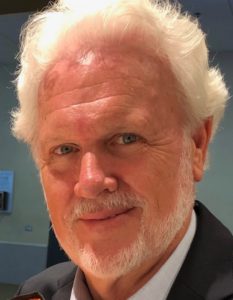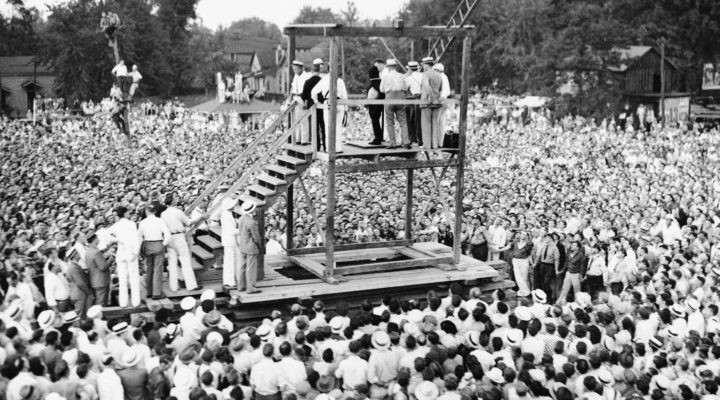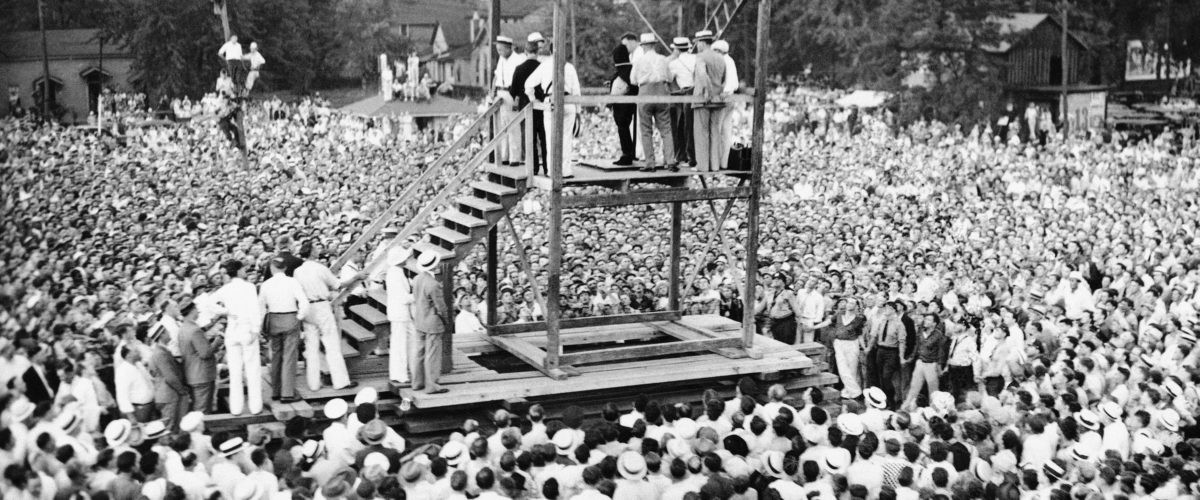My dad, Tom Moody, was there. Aug, 14, 1936. Owensboro, Ky. The last legal public hanging in America.
“My brother and I got up before dawn and hitchhiked into town,” he said many years later. “There were lots of cars going that day. Mom made us a lunch to carry.”
What do you remember, I asked?

Dwight Moody
“It was over so quick,” he replied; and most of the 20,000 or so others from as far away as New York City must have thought so as well.
His name was Rainey Bethea. He had committed several crimes, including murder; but the only one brought to a jury was rape because that was the only one that allowed a public execution.
Rainey was a young Black man from South Carolina.
“We stood 100 feet from the platform,” Dad told me. “I was 13 years old.”
What does it do to a young white boy to stand in a sea of white people and watch the public hanging of a young Black man?
Months later, my unchurched Dad was invited by a county pastor to attend a revival. He went and, as Providence would have it, he walked the aisle and professed his faith in Jesus Christ. He was baptized in a creek somewhere out State Road 81, west of Owensboro.
I’m going to Owensboro next week to hunt for the creek in which my Dad was baptized, to find out who did the preaching for that revival and who did the dipping.
For Tom Moody, it was the beginning of seven decades of Christian life and service. He graduated from the University of Kentucky with a math degree but gave it up two years later. Good gospel work occupied him until the day of his death in 2013. He served churches in Lexington, Murray and St. Louis. Somewhere along the way he was ordained; I preached the sermon and joined with those who laid hands on his head.
“I am intrigued by how the hanging and the dipping together formed him as a person, a believer and a minister.”
I am inspired by how it all started. But I am also intrigued by how the hanging and the dipping together formed him as a person, a believer and a minister.
Those were Jim Crow days in West Kentucky (and everywhere else). That public hanging in 1936 was a reminder of the stark difference between the white and the Black. How did those two events frame what it meant to be a baptized believer, a follower of Jesus, a Christian? Was my Dad baptized into the white supremacy that infected every institution in his county even while he was baptized into Christ?
When I’m in Owensboro, I’ll begin my exploration of the expansive archive of that hanging held by the Daviess County Public Library. It’s all in the Kentucky Room, and I’ve already been told I need the special permission of the curator. I’m not sure why.
My research will take months, but I don’t mind since I once lived in that fair city while serving as pastor of a large Baptist church just one block from where the rape, murder and theft occurred. I wonder if any of the actors in this strange drama were members of Third Baptist Church. I know some attended the Methodist church, which still sits one block on the other side of the site.
Most of all I hope to tell a story from the last century that will speak to this century. Not since the work of Martin Luther King Jr. more than 50 years ago has our country been engaged in such a serious and sustained conversation about race, religion and what it means to be human. Perhaps the details of things from my father’s growing up years will contribute to the dialogue that is occurring during the growing up years of his great-grandson.
By the time I set it all on paper that young boy, Sam, will be 13 and ready for his own trip to a pool of running water, there to be dipped all the way under and pulled up dripping wet. May the Good God of us all fill him, like that boy in 1936, with a kindness toward all people and a love for Jesus.
But he will also need the courage to fight the deadly diseases of the soul that separate us one from another. Give him, O Lord, a double portion of your Spirit!
Dwight A. Moody is an author, minister, scholar and radio host. He lives on St. Simons Island, Ga. He is host of the media site The Meeting House.
Related articles:
Jesus was lynched. Holy Week’s symbols should include a cross and a noose
White Christians should make pilgrimage to new Lynching Memorial, Baptist leader says
Ahmaud, Breonna, Christian, George, and The Talk every black boy receives


